Global Urban Humanities Graduate Core Seminar Spring 2020
CYPLAN 291/THEATER 266.1
4 units
W 9-12
214B Wurster
Instructors: Jason Luger (City & Regional Planning) and Angela Marino (Theater, Dance and Performance Studies)
This theory and methods course examine a foundational set of readings in urban humanities. Required for the Graduate Certificate in Global Urban Humanities. For more, visit the Graduate Certificate Program page.
.png) The “demos” suggests the people, so often referenced in political discourse as the core of democracy. Yet, from its inception, exclusions and the promised benefits for those who operate within the demos (in western societies typically as white citizens with property) have generated long-standing inequities and division. This course looks at contending struggles to undo and reconstitute the demos in urban spaces through art, performance, and media. We trace the ways in which various forms of collective political action recreate public space in metro areas around the world. From murals to graffiti, to digital media and music, to bridges and public schools, students will be exposed to interdisciplinary methods to analyze the built environments and how people move, work, eat, learn, listen and express themselves in these environments, in particular when people challenge meanings of demos and create new ones. Sites of interest may also include voting districts, town halls, streets and alleyways, museums, trains, eateries, and plazas as spaces of public political expression. Throughout, students will critically consider questions of how the demos and other systems of collective political action are constructed. How do different groups of people organize themselves within urban spaces? What forms of representation emerge that challenge or reinforce democratic practice, its ideals, and its failures? Students will work with a variety of methods including ‘hanging out,’ digital mapping, sensory observation, print-making design, and participant action planning to develop graduate-level research as portfolios or article/essay.
The “demos” suggests the people, so often referenced in political discourse as the core of democracy. Yet, from its inception, exclusions and the promised benefits for those who operate within the demos (in western societies typically as white citizens with property) have generated long-standing inequities and division. This course looks at contending struggles to undo and reconstitute the demos in urban spaces through art, performance, and media. We trace the ways in which various forms of collective political action recreate public space in metro areas around the world. From murals to graffiti, to digital media and music, to bridges and public schools, students will be exposed to interdisciplinary methods to analyze the built environments and how people move, work, eat, learn, listen and express themselves in these environments, in particular when people challenge meanings of demos and create new ones. Sites of interest may also include voting districts, town halls, streets and alleyways, museums, trains, eateries, and plazas as spaces of public political expression. Throughout, students will critically consider questions of how the demos and other systems of collective political action are constructed. How do different groups of people organize themselves within urban spaces? What forms of representation emerge that challenge or reinforce democratic practice, its ideals, and its failures? Students will work with a variety of methods including ‘hanging out,’ digital mapping, sensory observation, print-making design, and participant action planning to develop graduate-level research as portfolios or article/essay.
Throughout, students will be exposed to and critically consider different kinds of methodologies, including interview methods, observation, discourse analysis, formal analysis, archival research, and photography.
Enrollment for this course is first come, first serve. No application necessary.
For more information, contact Profs. Jason Luger (jdluger@berkeley.edu) and Angela Marino (angela.marino@berkeley.edu).
